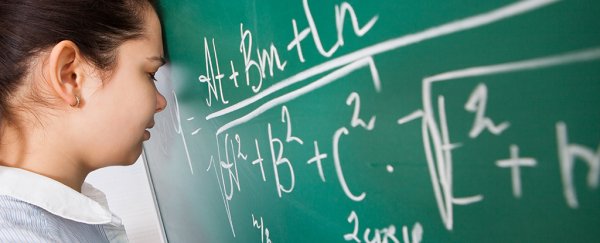If you're struggling through a course in Calculus 101 in your tertiary degree right now, wishing you'd paid attention in high school, we've got some good news: it probably wouldn't have helped.
A study of more than 6,200 freshmen at 133 colleges and universities across the US has found you'd have been better off mastering the basics than cramming for that senior level calculus exam.
There are really only two kinds of human: those few who get calculus the first time, and everybody else. It's abstract, requires a solid comprehension of numerous fundamental mathematical principles, and – at first glance – unlikely to be useful.
Most high school mathematics teachers who haven't been reduced to cynical comedians will do their best to come up with some creative reason for learning it.
Some maintain there is merit, even if it's to better prepare the few who are destined to go on to further mathematical study.
Two researchers from the Science Education Department of the Harvard Smithsonian Centre for Astrophysics set out to find evidence that might give those poor teachers better ammunition. Instead, they appear to have made their task harder.
If you need a quick refresher, calculus is a way to measure a continuous change. We largely have the English polymath Isaac Newton to thank for it, though his German contemporary Gottfried Leibniz independently came up with it around the same time.
Like Gottfried, schoolchildren ever since have muttered under their breath in their contempt for Newton's ingenious mathematics, despite its invaluable applications in everything from astrophysics to economics.
Of course, if you're studying to be an astrophysicist, having a solid grasp of integral calculus is essential. What's up for debate is where that calculus journey really should start.
"We wanted to see if we could settle that argument," says researcher and physicist Philip Sadler.
"Which is more important, the math that prepares you for calculus, or a first run-through when you're in high school followed by a more serious course in college?"
Together with colleague Gerhard Sonnert, Sadler asked 6,207 students to questions about their family backgrounds, educational history, and mathematics experience.
They combined the information with mathematics test scores in an anonymised database and analysed whether having slogged out a course in calculus in high school offered any kind of boost.
Taking into account differences in factors such as upbringing and socioeconomics, the results were pretty surprising.
Some students did benefit from calculus – the weaker ones. But if you're already eyeing off the coveted valedictorian, those lessons in calculus probably won't do you much good.
To really ensure students nail calculus at college or university, a good grasp of the basics is a must. The research found that success in gaining prerequisite skills had twice the impact than success in an early introduction.
It's hard to say why weaker students generally got more out of that introduction than their peers, but the researchers suggest it could come down to a teacher's personal attention, which isn't like that of a college professor's.
"They won't go back and cover the things that you may be missing like a teacher can do in high school," says Sadler.
An overloaded curriculum is a common complaint across many educational systems across the world.
Every topic jostles for space, and teachers are often left defending lessons with one eye on moving rapidly onto the next chapter. Dropping calculus could free up much-needed space to double down on basic principles students just aren't getting.
"The one thing the paper says is if your background is strong, if you really know your algebra, geometry and pre-calculus, you're going to do well in college calculus," says Sadler.
It's unlikely a single study will see high school calculus get left out of text books any time soon, though it might help ease both teacher and student stress knowing that failing senior calculus isn't a big deal.
This research was published in Journal for Research in Mathematics Education.
